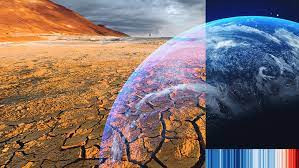
A LOT of events are unfolding before us. Some are entertaining. Some are sad. Some give hope, while others are scary. In the main, the world and the earth are headed towards potentially huge catastrophes if humans do not invest their attention in the right existential threats. Admittedly, humans can only have one concentrated focus at a time. The basic belief behind multi-tasking is an illusion and what is before us demands that we be more focused on one thing — climate change.
The war in Ukraine is still upon us for unclear reasons despite having a devastating global economic impact. Its impact is worsening what COVID-19 started and it is perpetuated by nothing but human greed and egos.
Even if the war ends today, the economic impact will remain for decades. Nonetheless, the senseless war must end so we can all focus on what is unfolding before us — climate change.
The past weeks were characterised by what looked like beautiful events with people in Johannesburg and other parts of South Africa posting photos of snowfall. Social media platforms, for once looked like there was an early Christmas experience akin to the northern hemisphere. In Gauteng, South Africa, they experienced the coldest week of 2023 when temperatures dropped below the freezing mark. This was due to the cold front that was expected to hit the northern part of the country. Some argued that Monday July 10 was recorded as the coldest day in a dozen years.
Snow is not a new phenomenon in the mountain Kingdom of Lesotho, but it started as early as May and has continued throughout the larger of this winter. All these developments are accompanied by some excitement but there are part of bigger events happening around us.
As the southern hemisphere enjoyed the snowfall and white blanket cover that lay across much of Gauteng, the northern hemisphere had a different story to endure. Severe heatwaves were sweeping across Asia, Europe and North America and the month of July this year holds the record for the hottest day in history. The heatwaves sent millions of people scrambling for water, cooling facilities, and cover. That was not all. Canada and several other countries in the northern hemisphere experienced intense wildfires posing a major threat to human life, infrastructure, and livelihoods.
It is not just extreme cold weather and heatwaves. Several Asian countries, including India, China, Japan, the Philippines, and South Korea are grappling with severe rains, flooding, and landslides. Hundreds of people have been killed, while hundreds of thousands have been affected or displaced. And again, just like the freezing temperatures and heatwaves, the amount of rain received is reported to be record-breaking — a scenario that tells us that our situation on mother earth has changed. We either must step up efforts to slow down climate change or adapt quickly.
There is a challenge with the way climate change has been handled over the past three decades. At a higher level, it has been treated as a political issue instead of a threat to humanity. One conference after another, there have been agreements and arguments over carbon emissions, and these have turned into power contests instead of being platforms for solutions.
- Young entrepreneur dreams big
- Chibuku NeShamwari holds onto ethos of culture
- Health talk: Be wary of measles, its a deadly disease
- Macheso, Dhewa inspired me: Chinembiri
Keep Reading
It is at grassroot levels where the real impact of climate change is felt. Consecutive droughts and warm temperatures are depleting surface water levels and contributing to environmental degradation. This means that arable land is slowly depleting thus exposing millions of people to hunger and destitution.
In some places, scarcity of natural resources is causing tensions and conflict, while in others it is resulting in internal displacement and migration both of which can trigger tensions. The more the large part of mother earth becomes unusable, the more people will be squashed in habitable places. This too may result in conflicts.
The million-dollar question is whether something can be done to slow down or reverse climate change. So far scientists tell us that while the world cannot stop global warming overnight, we can slow the pace and limit the amount of global warming by reducing carbon emissions of heat-trapping gases and soot.
Carbon energy powers industrialisation which gave us the current economic growth. It is the mainstay of our current ability to be productive and sustain lives. But recent studies have shown that carbon energy is replaceable but doing so threatens the global political power system and that is where the issue is.
Scientists tell us that if all carbon emissions of heat-trapping gases stopped today, the temperatures may continue to rise albeit at a slower pace for a couple of decades allowing the release of excess heat stored in the deep oceans to the surface. The assumption is that once this process happens, it is possible that the earth’s temperature can stabilise.
These are some of the issues member States and parties must grapple with at the 2023 Climate Change Conference (COP 28) from November 30 to December 12 at the Expo City, Dubai. The world is pinning its hopes on these conferences mainly the realisation that climate change is no longer in the future but in our midst.








